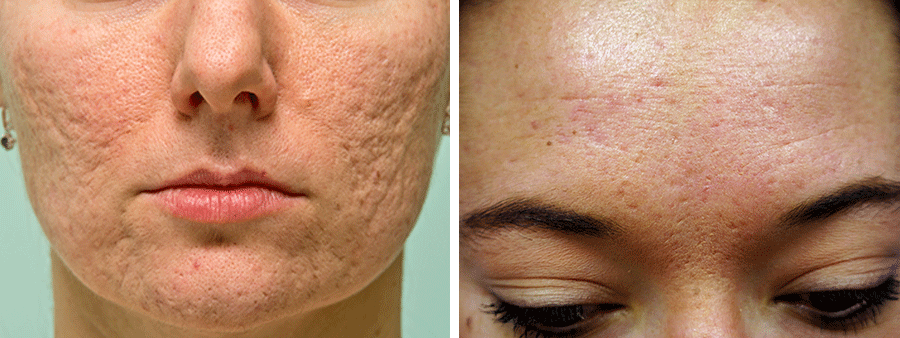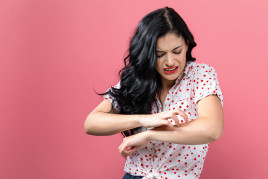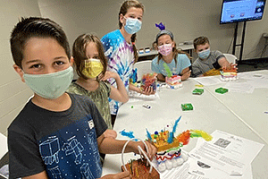Acne scars: Overview
What are acne scars?
Acne scars
When a deep pimple or other acne breakout clears, a scar can develop. Scars that form after acne clears are called acne scars. Not every acne breakout causes a scar.
Are acne scars permanent? While acne scars can fade, they rarely go away completely on their own. Partnering with a board-certified dermatologist can help you diminish acne scars. Dermatologists help many people with acne scars to see smoother and more even-toned skin.

Can you prevent acne scars?
You may be able to reduce your risk of developing acne scars if you:
Treat acne when you first notice it and continue treatment. Preventing acne can prevent acne scars. That’s why dermatologists recommend treating acne when you get your first breakouts.
In the beginning, acne tends to be mild. Treating mild acne with medication that you buy without a prescription can prevent new breakouts. This means deeper acne breakouts, which are more likely to cause scarring, never develop.
Early treatment is especially important if you have a close blood relative like a parent or sibling who has (or had) acne scarring. Having a close blood relative who has (or had) acne scars increases your risk of developing acne scars.
Here are dermatologists’ tips for treating acne at home:Never pick, pop, scratch, or squeeze breakouts. When you do any of these, you increase inflammation in your skin. The more inflamed your skin, the more likely you are to get an acne scar. You also increase your risk of infection and discoloration.
To get rid of acne breakouts, dermatologists recommend that you treat them instead. If you have a deep, painful pimple that is causing you discomfort, your board-certified dermatologist can treat it.Stop touching your acne. Touching can worsen acne. When acne worsens, it’s more likely to scar when it clears.
Why do some people get acne scars while others don’t?
You’re more likely to develop acne scars if you:
Develop deep, painful acne.
Have a close blood relative with acne scars.
Pop, pick, squeeze, or scratch at your breakouts to get rid of them.
How long does it take for acne scars to fade?
When an acne scar first appears, you may see a depression (indent in your skin) or a raised scar, along with some discoloration. Over time, the discoloration usually goes away. However, the scar remains.
If you see a flat spot of color on your skin when acne clears, this usually isn’t an acne scar. It’s likely post-inflammatory hyperpigmentation (PIH).
You’ll find more information about PIH and the different types of acne scars at Acne scars: Signs and symptoms.
Images
Image 1: Getty Images
Image 2: Reproduced with permission from ©DermNet www.dermnetnz.org 2023.
References
Abdel HR, Shalaby K, et al. “Interventions for acne scars.” Cochrane Database Syst Rev. 2016 Apr 3;4(4):CD011946.
Jennings T, McLarney M, et al. “Acne scarring-pathophysiology, diagnosis, prevention and education – Part 1.” J Am Acad Dermatol (2022) [journal pre-proof].
Patel MJ, Antony A, et al. “Atrophic acne scars may arise from both inflammatory and non‐inflammatory acne lesions.” 2010 Annual Meeting of the Society for Investigative Dermatology Atlanta, GA United States. Conference Start: May 5, 2010. Conference End: May 8, 2010. J Invest Dermatol. 2010;130(Suppl 1s):S58.
Written by:
Paula Ludmann, MS
Reviewed by:
Kesha Buster, MD, FAAD
Sandy Marchese Johnson, MD, FAAD
Desmond Shipp, MD, FAAD
Last updated: 12/8/23
 Atopic dermatitis: More FDA-approved treatments
Atopic dermatitis: More FDA-approved treatments
 Biosimilars: 14 FAQs
Biosimilars: 14 FAQs
 How to trim your nails
How to trim your nails
 Relieve uncontrollably itchy skin
Relieve uncontrollably itchy skin
 Fade dark spots
Fade dark spots
 Untreatable razor bumps or acne?
Untreatable razor bumps or acne?
 Tattoo removal
Tattoo removal
 Scar treatment
Scar treatment
 Free materials to help raise skin cancer awareness
Free materials to help raise skin cancer awareness
 Dermatologist-approved lesson plans, activities you can use
Dermatologist-approved lesson plans, activities you can use
 Find a Dermatologist
Find a Dermatologist
 What is a dermatologist?
What is a dermatologist?